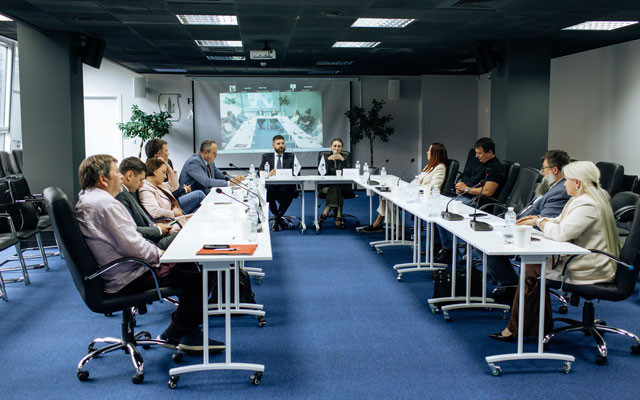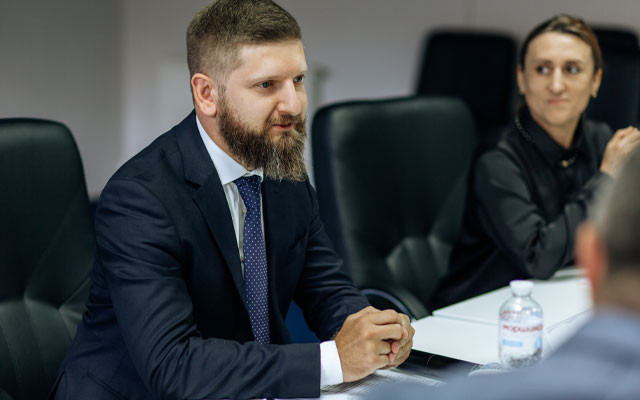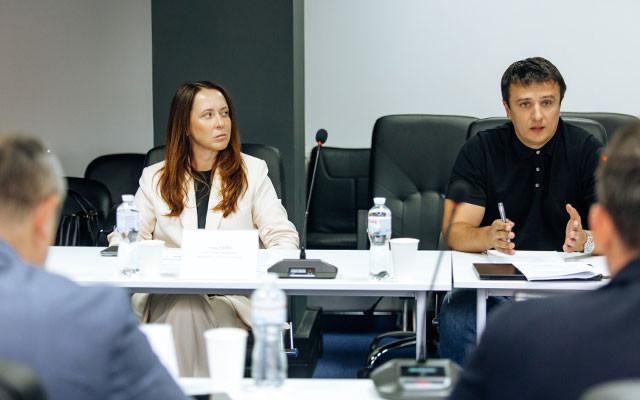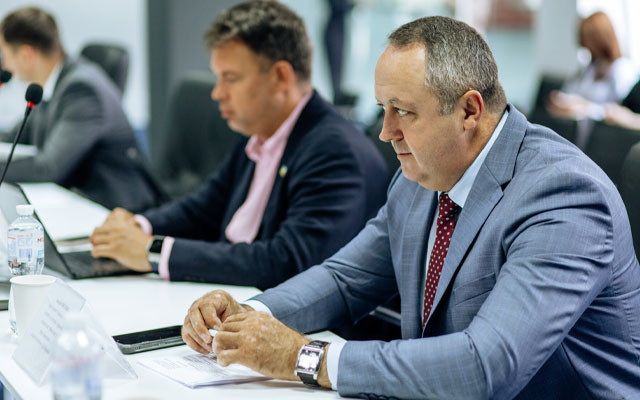
Protection during the selection of preventive measures: guarantees or formalities?




The right to defense in criminal proceedings should ensure real equality between the parties, especially when choosing preventive measures. However, court overload and a formal approach to the participation of defense counsel often reduce guarantees to mere declarations.
These issues were discussed during the roundtable discussion «The effectiveness of the right to defense in the application of precautionary measures: guarantees, challenges and ways to ensure them», which took place on September 12. The event, organized by the UNBA Committee on human rights, brought together judges, advocates, human rights defenders, and experts.
Bogdan Hlyadik, a member of the Committee, outlined the key obstacles that complicate the full realization of the right to defense when choosing a preventive measure. He noted that this right should be implemented as a comprehensive system of guarantees, namely:
- the possibility of engaging a defense attorney from the moment of actual detention of the person;
- proper notification of suspicion and the grounds for the prosecutor's application to the court for the selection of a preventive measure;
- ensuring that the defense attorney has adequate access to the materials on which the motion is based, as well as sufficient time to analyze them and prepare for the defense;
- the possibility of preparing and submitting objections, adding evidence, and fully participating in the court hearing.
In addition, a public and fair hearing on the issue of restriction of personal freedom remains an important element.
At the same time, the implementation of guarantees faces a number of difficulties. B. Hlyadik named the main ones as a chronic lack of time for proper preparation, restricted access to materials, and a lack of proper cooperation between defense attorneys appointed by contract and by appointment.
In this regard, Roman Haidai, his colleague on the Committee, drew attention to the practice of prosecutors simultaneously filing a motion for a preventive measure and issuing a decision to appoint an advocate, even in cases where it is known for certain that the suspect already has a defense advocate under contract. In such cases, the contracted defense attorney often does not receive notification of the consideration of the motion and is effectively removed from participation in a critically important procedural action. The court-appointed defense attorney tries to find out whether the client has a chosen defense attorney and to find his or her contact information in order to coordinate the legal position, but it is obvious that such a situation contradicts the very principle of effective defense.
Continuing the discussion, advocate Serhiy Boiko emphasized the need to specify the powers to appoint a court-appointed defense attorney. In his opinion, it is the prosecutor and the investigating judge who are obliged to verify whether there is a real need for such involvement and whether it is indeed impossible for a defense advocate to participate under contract. After all, free legal aid centers objectively do not have information about whether the suspect has a defense advocate under contract and therefore cannot independently assess the advisability of appointing a defense advocate. In cases where there is a risk of «duplication» of defense, it is necessary to contact the centers with lawyer requests. Preventive notifications to the FLA centers that a specific person has a defense attorney and does not need the involvement of a defense attorney whose services are paid for by the state budget can also be effective.
Advocate Andriy Domansky joined the discussion, drawing attention to situations where an FLA advocate is appointed to participate in all proceedings, even though the suspect has contracted defense counsel. This not only undermines the client's freedom to choose an advocate, but also creates a kind of pressure mechanism: the appointed advocate is forced to attend all hearings under threat of liability for refusal, while the actual protection of the person's interests takes a back seat.
The advocate also highlighted the lack of time to familiarize himself with the case materials. He cited an example from his own practice in the High Anti-Corruption Court, when, acting as the suspect's defense attorney in the consideration of the issue of choosing a preventive measure, he was given only 40 minutes by the investigating judge to familiarize himself with 18 volumes of criminal proceedings. The court's reasoning was that the advocate, as a professional in his field, was supposedly capable of processing such a volume of material in the allotted time. However, such reasoning seems questionable, to say the least, as it deprives the advocate of the real opportunity to prepare adequately for the court hearing and, consequently, the suspect of effective defense.
Oleksandr Baranov, director of the Coordination center for legal aid, emphasized the regulatory requirements for advocates involved in certain procedural actions. He reminded that, according to the Rules of professional conduct for advocates, such a defense advocate is obliged to agree on the legal position with the main advocate, and if this is impossible, to file a motion to refuse to provide defense, which is an important element of compliance with the highest standards of cooperation between advocates and mutual respect.
At the same time, O. Baranov pointed out that FLA centers do not have the authority to influence situations where a prosecutor or investigating judge sends them a decision to appoint a defense advocate to a suspect who already has an advocate. In such cases, the center is obliged to comply with the court's decision, even if it is obvious that the involvement of an additional advocate is superfluous and contrary to the client's interests. Thus, it is the prosecutor and the investigating judge who should verify the expediency of appointing a defense advocate.
This thesis was supported by Marina Lukianova, the acting director of the Northern interregional center for FLA, who drew attention to another serious problem. Recently, in decisions on the appointment of a defense advocate, investigative or judicial authorities not only oblige representatives of FLA centers to ensure the continuous participation of an advocate in procedural actions, but also warn of criminal liability in case of improper performance of this duty. This creates a paradoxical situation: instead of performing their professional duties of organizing work, the heads of regional centers are forced to participate in interrogations and effectively defend themselves in criminal proceedings brought against them. Several cases of criminal proceedings against heads of FLA centers have now been recorded. This creates a dangerous precedent: instead of guaranteeing a person's right to defense, the system itself is under pressure.
Olena Chaika, Judge of the Shevchenkivskyi district court of Kyiv, revealed the practical difficulties that arise in the process of considering motions for the selection of a preventive measure immediately after a person's arrest. According to her, the standard should be maximum assistance from the investigating judge in ensuring the right to defense, because it is at this moment that it is critically important for the suspect to receive qualified legal assistance. However, the time allotted by law for considering such motions is insufficient. In practice, no one is brought to court within the first few hours after arrest, which automatically reduces the time that the judge can allocate to the defense advocates and himself to prepare and analyze the case materials.
The judge also focused on situations involving the involvement of an FLA. The investigating judge must use all possible means to find out whether the detainee has a chosen defense advocate, whether he or she is able to arrive at the court promptly, and if not, whether there is another advocate with whom contact can be established. Only after clarifying these circumstances is it possible to ensure the real, rather than formal, participation of the defense advocate in the proceedings.
At the end of the event, Andriy Ovsienko, Ombudsman representative emphasized the key importance of communication and interaction between all participants in the justice system. In his opinion, only through open dialogue and honest discussion of existing problems can effective ways to overcome them be found.
The discussion showed that the problem of ensuring the right to defense when deciding on preventive measures remains multifaceted and requires a systematic response. The focus should remain not on the formal fulfillment of procedural requirements, but on the real implementation of the right to defense. This is the true embodiment of the principle of the rule of law, without which it is impossible to talk about fair justice.
© 2025 Unba.org.ua Всі права захищені
"Національна Асоціація Адвокатів України". Передрук та інше використання матеріалів, що розміщені на даному веб-сайті дозволяється за умови посилання на джерело. Інтернет-видання та засоби масової інформації можуть використовувати матеріали сайту, розміщувати відео з офіційного веб-сайту Національної Асоціації Адвокатів України на власних веб-сторінках, за умови гіперпосилання на офіційний веб-сайт Національної Асоціації Адвокатів України. Заборонено передрук та використання матеріалів, у яких міститься посилання на інші інтернет-видання та засоби масової інформації. Матеріали позначені міткою "Реклама", публікуються на правах реклами.